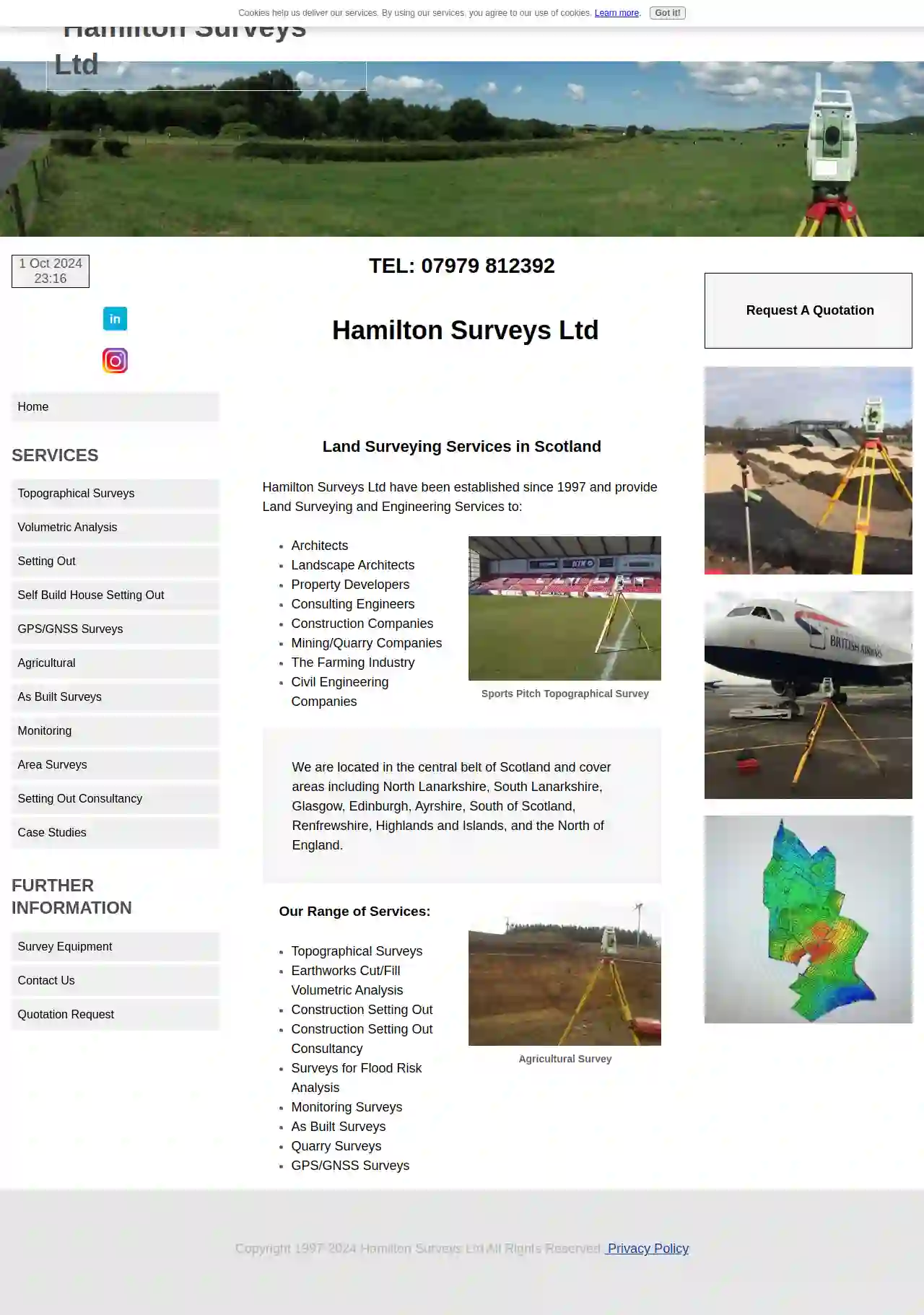Excavation Contractors Lanark
Top 10 Excavation Contractor in Lanark
Get 3 FREE Excavation Company Near Me quotes for your project today! Compare profiles, reviews, accreditations, portfolio, etc... and choose the best service.

Hamilton Surveys Ltd
4.52 reviewsHamilton, GBHamilton Surveys Ltd Hamilton Surveys Ltd has been established since 1997 and provides Land Surveying and Engineering Services to a wide range of clients, including: Sports Pitch Topographical Survey Architects Landscape Architects Property Developers Consulting Engineers Construction Companies Mining/Quarry Companies The Farming Industry Civil Engineering Companies We are located in the central belt of Scotland and cover areas including North Lanarkshire, South Lanarkshire, Glasgow, Edinburgh, Ayrshire, South of Scotland, Renfrewshire, Highlands and Islands, and the North of England.
- Services
- Why Us?
- Gallery
Get Quote
Centra Tech Drainage LTD
59 reviewsHamilton, GBWelcome to Centra Tech Drainage Ltd Your Trusted Partner in Drainage Solutions We specialize in providing top quality drainage services to residential and commercial customers alike. Whether it’s dealing with clogged drains, slow drainage, or other issues, we’re here to help. Our team of experts is dedicated to providing fast, efficient, and reliable solutions to get your drainage system running smoothly again.
- Services
- Why Us?
- Gallery
Get Quote
Burgh Resin Specialists
Hamilton, GBScotland's Epoxy Resin Surfacing Experts Burgh Resin Specialists are resin surface professionals providing resin bound driveways, rubber crumb flooring and Savoro flooring across Edinburgh, Glasgow, Falkirk, Fife and The Lothians. Working only with premium quality resins produced from traceable UK materials, we are experts in installing resin surfacing that outperforms any others on the market. We are Burgh Resin, specialist resin surfacing suppliers and installers working across Edinburgh, Glasgow, Falkirk, Fife and The Lothians, providing the strongest driveways, external and internal resin surfacing in the UK.
- Services
- Why Us?
- Gallery
Get Quote
MDS Landscape and Design Ltd
83 Gartloch Way, Gartcosh, G69 8FD, GBExperienced garden landscapers in Glasgow When it comes to garden landscaping and design, MDS Landscape and Design Ltd is the company to contact. If you are thinking of having your garden landscaped, get in touch by completing our contact form or giving us a call. Here at MDS Landscape and Design Ltd, we have more than 30 years of combined experience in garden landscaping, working with homeowners and commercial clients alike. Based in Glasgow, we work across a wide area, which includes Lanarkshire, West Lothian, Midlothian, and Renfrewshire. Our company is built on the foundation of customer satisfaction, and we approach each project with the same level of care and attention to detail that we would like for our own garden. Whatever type of hard or soft landscaping project you are considering, get in touch with us for a competitive quotation.
- Services
- Why Us?
- Testimonials
- Gallery
Get Quote- (R
(Road Surfacing) (tarmac Driveways) Lanarkshire Glasgow. Wjt Trades Ltd
4.73 reviewsHamilton, GB- Services
- Why Us?
Get Quote - Dy
Dyno
Hamilton, GB- Services
- Why Us?
Get Quote - Ta
Taylor Wimpey Oakwood Grove
41 reviewsHamilton, GB- Services
- Why Us?
Get Quote - Ti
Tinto Sand & Gravel Ltd
Hamilton, GB- Services
- Why Us?
Get Quote - Wi
William Shanks Construction
Hamilton, GB- Services
- Why Us?
Get Quote - No
Northlanarkshire Garden Care
52 reviewsHamilton, GB- Services
- Why Us?
Get Quote
Over 13,059+ Excavation Companies in our network
Our excavation providers operate in Lanark and surroundings!
ExcavationHQ has curated and vetted Top Excavation Businesses arround Lanark. Find a reliable pro today.
Frequently Asked Questions About Excavation Contractors
- Project Size and Scope: Larger, more complex excavations naturally take longer.
- Soil Conditions: Rocky or challenging soil types can slow down progress.
- Site Accessibility: Limited access might require more time for maneuvering equipment and hauling materials.
- Weather: Inclement weather can cause delays.
- Permitting and Inspections: Waiting for permits or inspections can extend the timeline.
- Experience: Choose contractors with a proven track record and years of experience in excavation projects similar to yours.
- Licensing and Insurance: Verify that they are properly licensed to operate in your area and carry adequate insurance to protect you from liability in case of accidents or damage.
- Equipment and Resources: Ensure they have the necessary equipment and resources to handle your project efficiently and safely.
- Positive Reviews and References: Check online reviews and testimonials from previous customers. Request references and contact them to inquire about their experience with the contractor.
- Professionalism: Opt for a company that communicates clearly, provides detailed and transparent estimates, and has a responsive and courteous team.
What is the difference between cut and fill excavation?
Cut: Involves excavating soil from an area where the existing grade is higher than the desired grade.
Fill: Refers to using the excavated soil ('cut' material) to raise the grade in an area where the existing grade is lower than desired.
This method minimizes the need to import or export soil, reducing costs and environmental impact. It's commonly used for site preparation, road construction, and landscaping.
How long does an excavation project take?
What is the difference between excavation and grading?
Excavation: Primarily involves removing earth or other materials from a site. It's about digging down and creating space.
Grading: Focuses on shaping and leveling the ground to a specific slope or elevation. It's about adjusting the existing terrain.
For example, you might excavate a foundation and then grade the surrounding area to ensure proper drainage and a level surface for landscaping.
How do I find a good excavation contractor?
What is the difference between cut and fill excavation?
Cut: Involves excavating soil from an area where the existing grade is higher than the desired grade.
Fill: Refers to using the excavated soil ('cut' material) to raise the grade in an area where the existing grade is lower than desired.
This method minimizes the need to import or export soil, reducing costs and environmental impact. It's commonly used for site preparation, road construction, and landscaping.
How long does an excavation project take?
- Project Size and Scope: Larger, more complex excavations naturally take longer.
- Soil Conditions: Rocky or challenging soil types can slow down progress.
- Site Accessibility: Limited access might require more time for maneuvering equipment and hauling materials.
- Weather: Inclement weather can cause delays.
- Permitting and Inspections: Waiting for permits or inspections can extend the timeline.
What is the difference between excavation and grading?
Excavation: Primarily involves removing earth or other materials from a site. It's about digging down and creating space.
Grading: Focuses on shaping and leveling the ground to a specific slope or elevation. It's about adjusting the existing terrain.
For example, you might excavate a foundation and then grade the surrounding area to ensure proper drainage and a level surface for landscaping.
How do I find a good excavation contractor?
- Experience: Choose contractors with a proven track record and years of experience in excavation projects similar to yours.
- Licensing and Insurance: Verify that they are properly licensed to operate in your area and carry adequate insurance to protect you from liability in case of accidents or damage.
- Equipment and Resources: Ensure they have the necessary equipment and resources to handle your project efficiently and safely.
- Positive Reviews and References: Check online reviews and testimonials from previous customers. Request references and contact them to inquire about their experience with the contractor.
- Professionalism: Opt for a company that communicates clearly, provides detailed and transparent estimates, and has a responsive and courteous team.